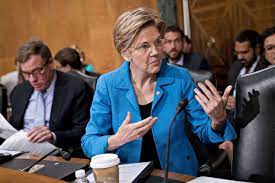Senator Elizabeth Warren, D-Mass., has announced her intention to reintroduce a bill to extend anti-money laundering laws to the cryptocurrency ecosystem.
The proposed legislation would apply to all digital asset wallet providers, miners, validators, and other participants in the blockchain network.
The bill, co-sponsored by Senator Roger Marshall, R-Kan., aims to give regulators the tools they need to curb crypto crime and stop the flow of crypto to drug traffickers and countries like North Korea.
During a Senate Banking Committee hearing on crypto guardrails, Warren expressed her concerns about the inadequate application of anti-money laundering rules to crypto companies.
The original version of the bill, introduced in December 2021, also sought to prohibit banks and other financial institutions from engaging in transactions with digital asset mixers that are designed to mask transactions made on public blockchains.
If the bill is introduced in its original form, it would extend anti-money laundering reporting requirements to include U.S. individuals who transact in $10,000 or more in digital assets using an offshore account.
The Treasury Department would also be required to conduct anti-money laundering compliance examinations for money service businesses, which are the registrations that large U.S. crypto companies fall under.
Warren argued that crypto was the payment method of choice for international drug traffickers, North Korean hackers, and ransomware attackers.
According to Warren, in just one year, these actors raked in over a billion dollars through crypto payments. The proposed bill seeks to introduce more stringent anti-money laundering rules around digital assets to prevent such activities.
The reintroduction of the anti-money laundering bill demonstrates the growing concern among lawmakers about the potential for illicit activities in the cryptocurrency ecosystem.
The bill aims to ensure that regulatory oversight keeps pace with technological innovation, and it could lead to greater clarity and standardization for cryptocurrency businesses operating in the United States.



